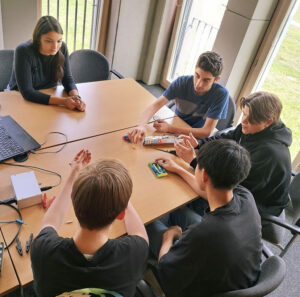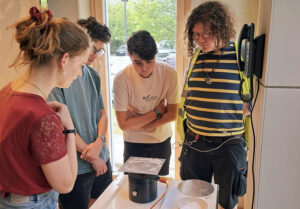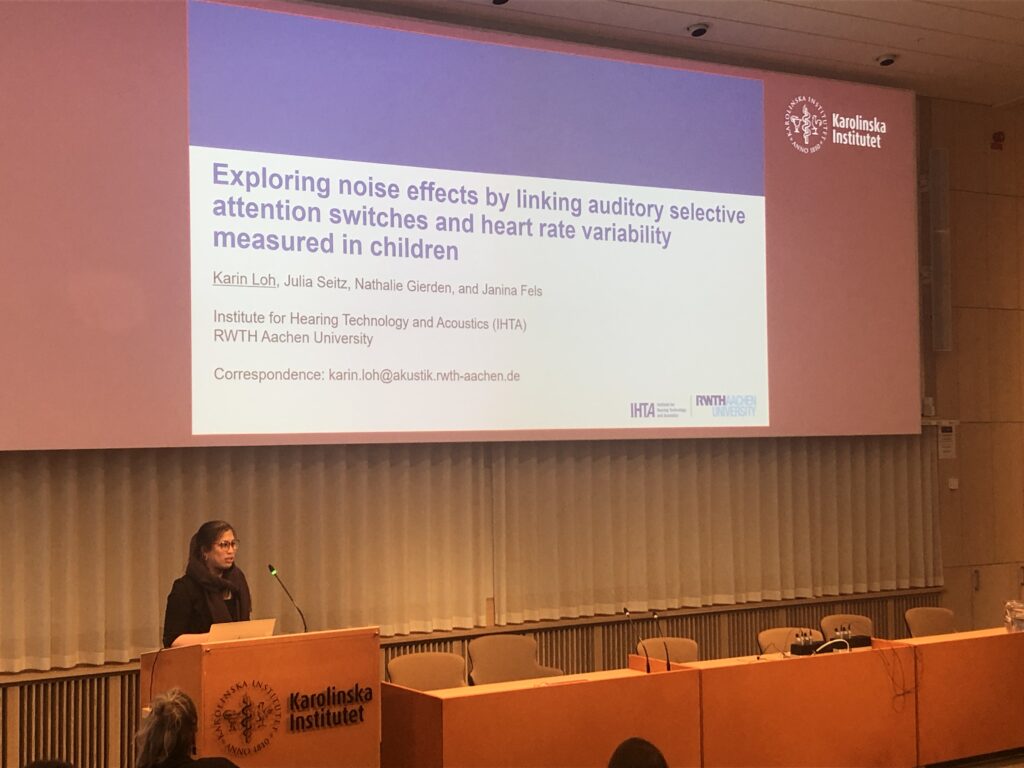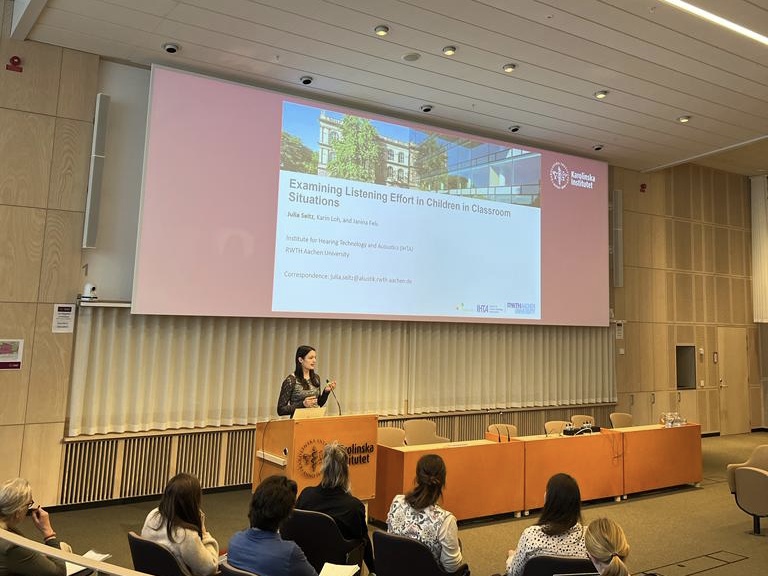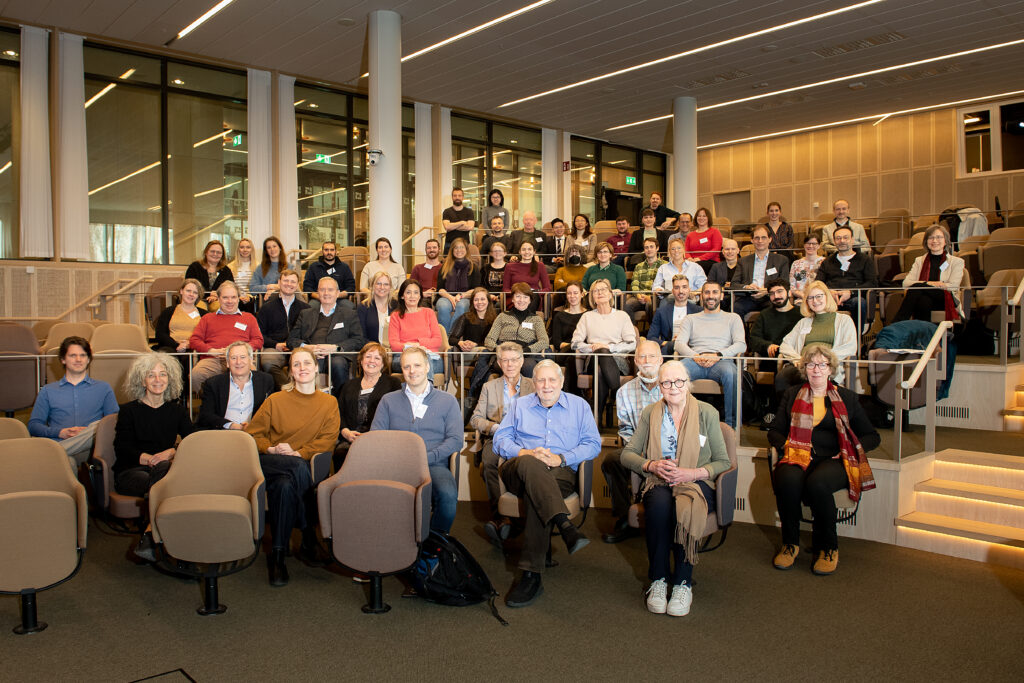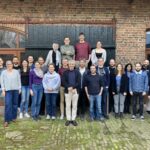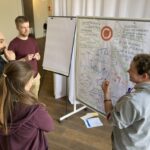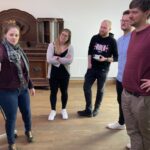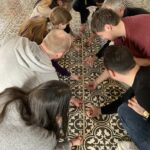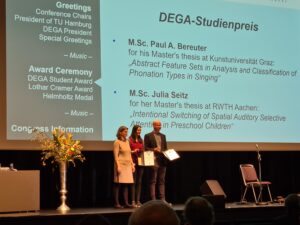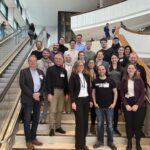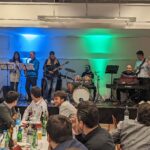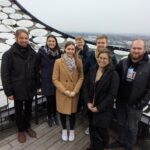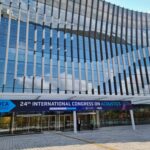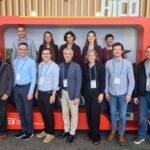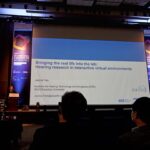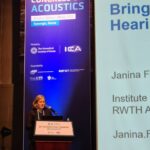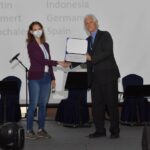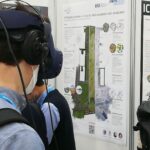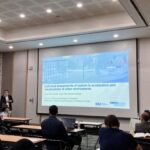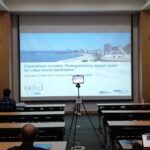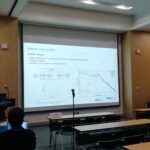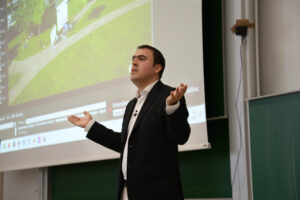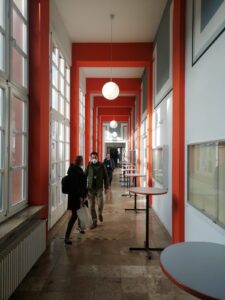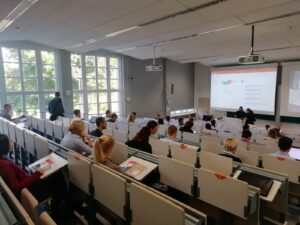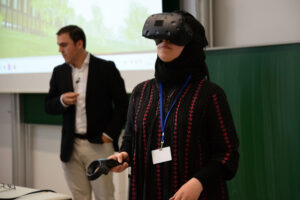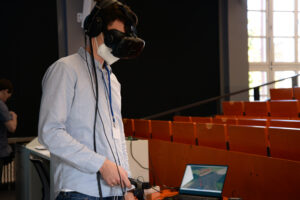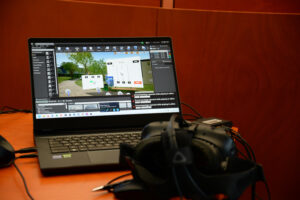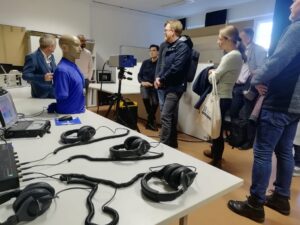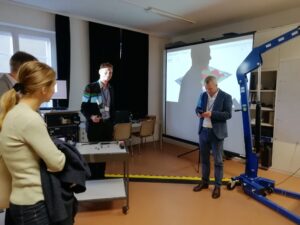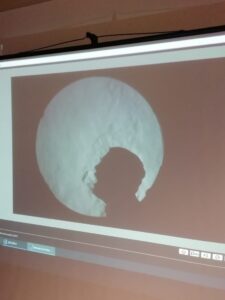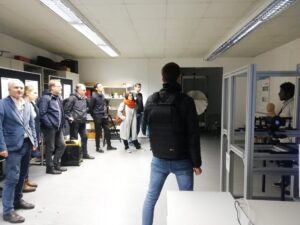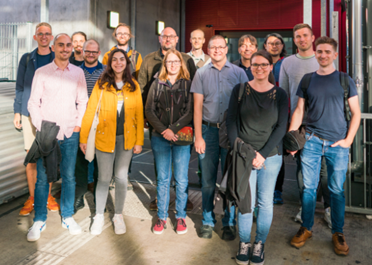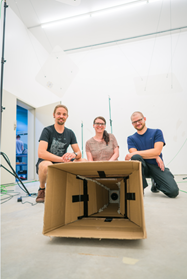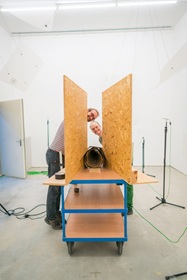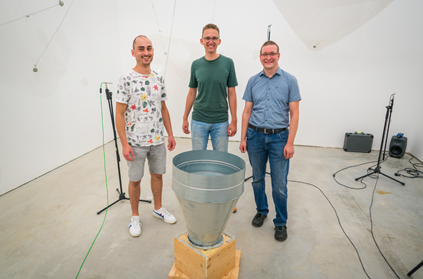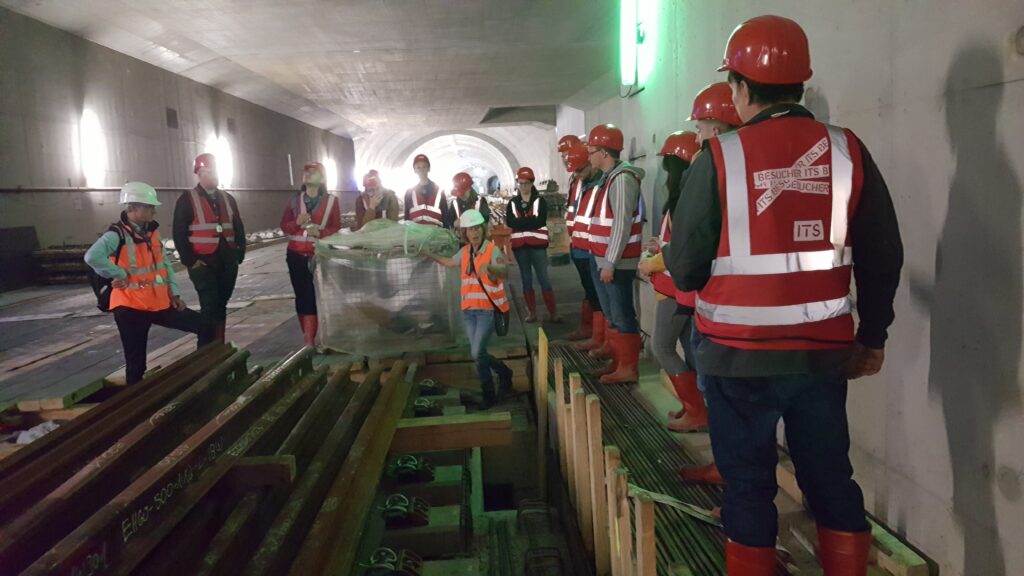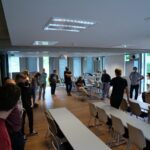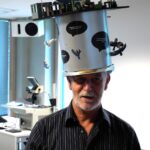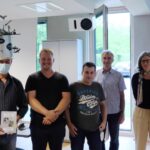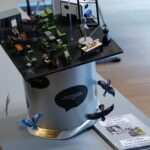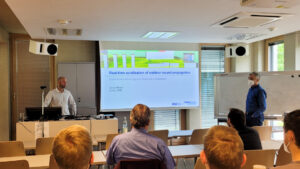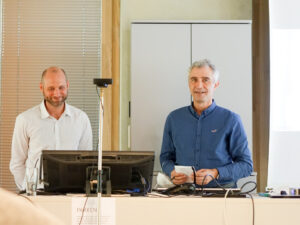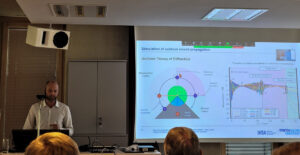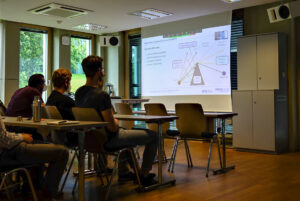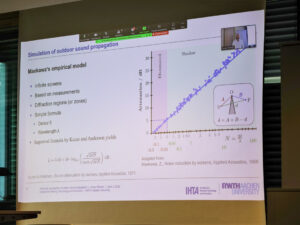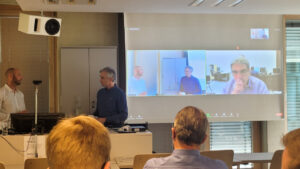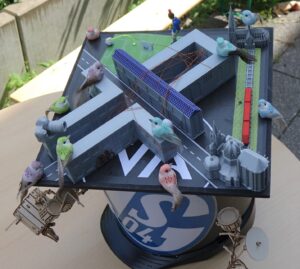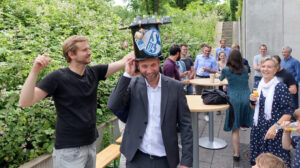Kategorie: ‘IHTA’
DAGA 2024 Travel Grants
Die Gesellschaft für Technische Akustik (GfTA e.V.) möchte Studierende des IHTAs unterstützen an der kommenden Jahrestagung für Akustik (DAGA 2024) teilzunehmen. Diese findet vom 18. bis zum 21. März 2024 in Hannover statt und bietet eine sehr spannende Möglichkeit, erste Erfahrungen bei wissenschaftlichen Konferenzen zu sammeln.

Die GfTA fördert in diesem Jahr zwei Studierende mit einen Reisezuschuss (Travel grant) in Höhe von jeweils 250€. Kandidat*innen müssen keinen wissenschaftlichen Beitrag bei der Konferenz einreichen, sollten aber zuvor noch keine DAGA-Konferenz besucht haben und an mind. einer Lehrveranstaltung am IHTA teilgenommen oder eine Abschlussarbeit angefertigt haben / aktuell anfertigen.
Um Dich für den Travel grant zu bewerben, schreibe eine Email an Lukas Aspöck und erkläre in ein oder zwei Sätzen, warum Du motiviert bist an einer Akustik-Konferenz teilzunehmen. Die Deadline für Bewerbungen ist der 14.12.2023, die Bekanntgabe findet bei der IHTA-Weihnachtsfeier am 19.12.2023 statt.
Besuch des Deutschen Hörgeräteinstitutes
Im Rahmen eines Workshops für junge Wissenschaflterinnen im Forschungsverbund SPP2236 – AUDICTIVE, durften wir das Deutsche Hörgeräteinstitut in Lübeck besuchen. Wir bekamen eine Führung durch die Räumlichkeiten des Prüflabors und eine Präsentation der Tätigkeiten. Vielen herzlichen Dank an den Leiter des Institutes Dr. Hendrik Husstedt, sowie den Mitarbeitern Dr. Florian Denk und Markus Kemper, die uns einen sehr interessanten Einblick in ihre Tätigkeiten gegeben haben.
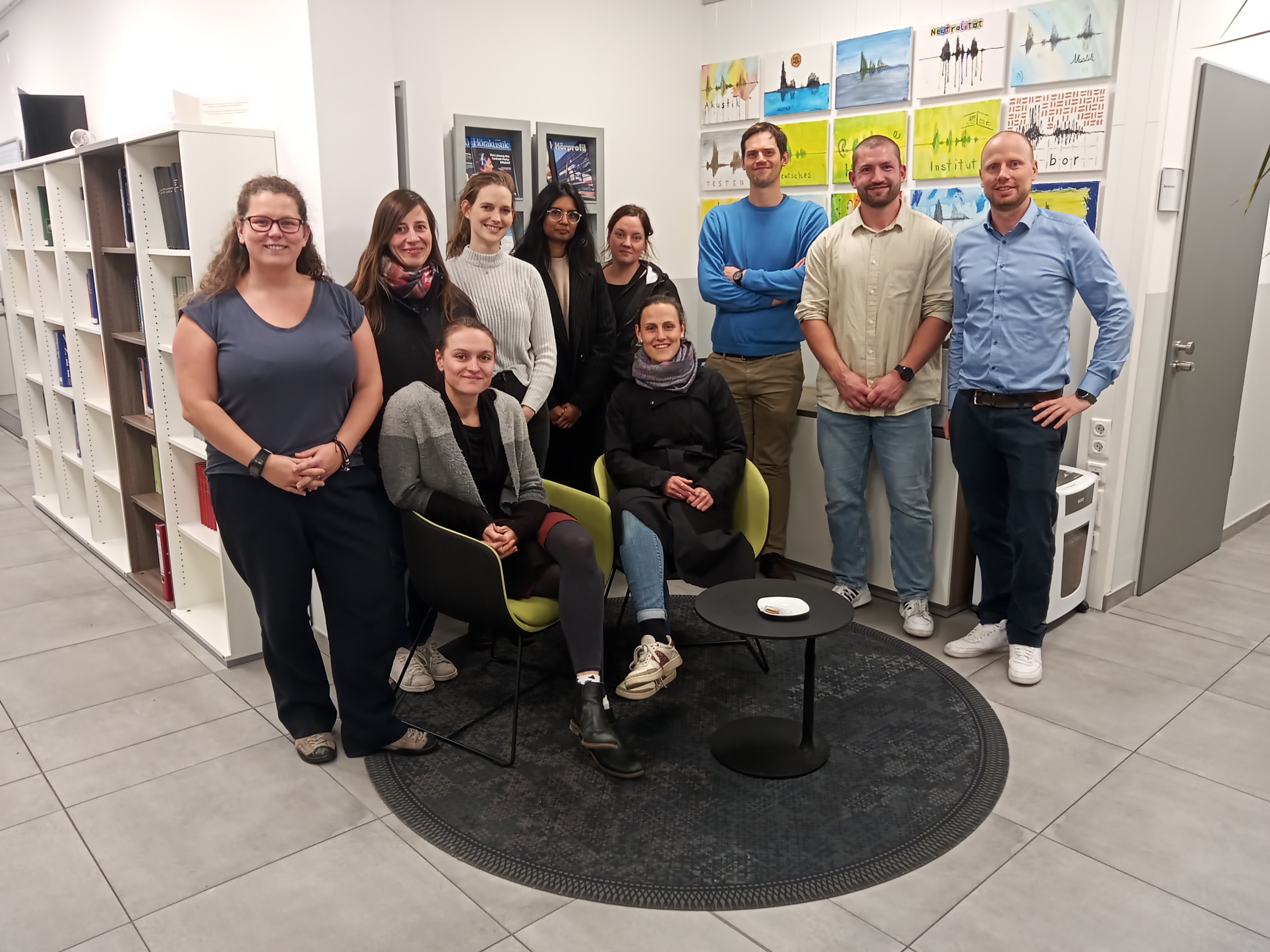
Besuch beim Deutschen Hörgeräte Institut. Foto: Jamilla Balint
junge DEGA Herbstworkshop 2023 – Ankündigung
Die Fachgruppe „junge DEGA“ der Deutschen Gesellschaft für Akustik e.V. (DEGA) veranstaltet regelmäßig einen Herbstworkshop mit dem Ziel, junge Akustikerinnen und Akustiker (Studierende, Promovierende, Young Professionals) zu vernetzen und persönlichen Austausch zu ermöglichen. Der diesjährige Herbstworkshop wird organisiert durch die aktuelle Leitung der Fachgruppe (Simon Kersten und Jonas Heck) mit Unterstützung weiterer Kolleg:innen des IHTA. Der Workshop findet vom 17.-19. November 2023 in Aachen statt.
Auf dem Programm des Herbstworkshops steht:
- Besuch des Instituts für Hörtechnik und Akustik (IHTA) an der RWTH Aachen, inkl. „Hands-On“-Workshop zur virtuellen Akustik
- Austausch zu Fach- & Promotionsthemen der Teilnehmenden
- Besuch weiterer Forschungseinrichtungen an der RWTH & Industriepartner
- Sitzung der junge DEGA-Fachgruppe
Anmeldung und Details zum Programm: https://www.dega-akustik.de/junge-dega/projekte (Anmeldeschluss: 31.10.2023).
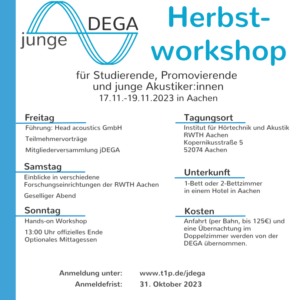
Jahrestagung der Gesellschaft für Musikforschung 2023
Im Rahmen der Jahrestagung der Gesellschaft für Musikforschung 2023 in Saarbrücken fand am 5. Oktober 2023 ein Marktplatz aktueller Forschung statt, in der Methoden und Werkzeuge für die digitale Musikforschung präsentiert werden konnten. Im Zuge der Zusammenarbeit mit Prof. Stefan Morent von der Universität im Projekt „Sacred Sound – Sacred Space“ demonstrierten unsere Mitarbeitenden Carolin Breuer und Pascal Palenda die Möglichkeiten, Räume akustische zu simulieren und auralisieren, in virtuelle Räume hinzusingen oder zu musizieren, sowie Räume in der Virtuellen Realität mit Hilfe eines Head-Mounted-Displays interaktiv akustisch-visuell erlebbar zu machen.
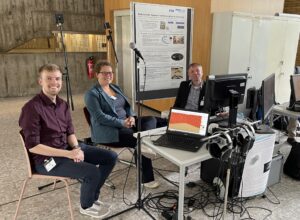
Stand bei der Jahrestagung für Musikforschung. Foto: Martin Albrecht-Hohmaier
RWTH Schüler*innenuni 2023 at IHTA
On July 20th, around 20 pupils aged 16 to 18 years, visited IHTA as part of the “Schüler*innenuni” by the Electrical Engineering faculty at RWTH Aachen. In a short introduction, they got insights into what research is conducted at IHTA and which role institutes take over at the university. Afterwards, they took part in four different workshops. They experienced the effect of standing waves, how we hear binaurally, and how the speed of sound and the Doppler effect are connected. Additionally, they built a simple loudspeaker with Lego bricks, aluminium foil, and magnets. To conclude the “Schüler*innenuni” workshop at IHTA, three research assistants presented what they studied and how they afterwards found their way into research. Everybody had a lot of fun experiencing some fundamentals of acoustics, the pupils as well as the assistants!
- Foto Anna Berglar
- Foto Anna Berglar
60 Jahre I(H)TA- Fest
Am Samstag, den 19. August 2023 wurde das 60-jährige Bestehen des IHTA/ITAs gefeiert.
Das Institut für Technische Akustik wurde nach einer Übergangphase ab 1961 offiziell am 2.1.1964 mit Prof. Dr. Wilhelm Janovsky als erstem Leiter gegründet. Es folgten 1972 Prof. Dr. Heinrich Kuttruff, 1996 Prof. Dr. Michael Vorländer und schließlich seit 2020 Prof. Dr.-Ing. Janina Fels als Leitung des heutigen Instituts für Hörtechnik und Akustik.
Über 120 Ehemalige und Aktive des Instituts nahmen an der Feier mit Führungen und Demonstrationen aktueller Forschungsthemen und natürlich am Essen, Getränken und Live-Musik der IHTA-Band teil.
Ein besonderer Dank gilt hier der Gesellschaft für Technische Akustik e.V. (GfTA), die diese Feier ermöglicht hat. Wer noch nicht Mitglied im Verein ist, kann dies hier (Beitrittserklärung) werden, damit wir auch weiterhin das Netzwerk aus Ehemaligen und Aktiven und dem Nachwuchs in der Akustik unterstützen und pflegen können.
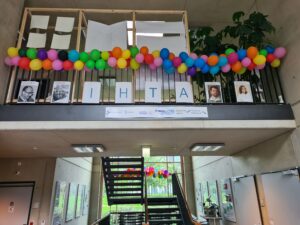
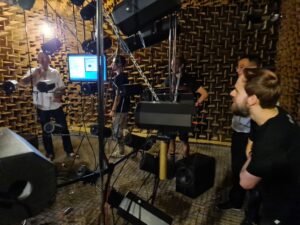
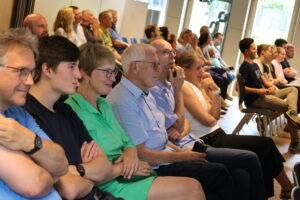
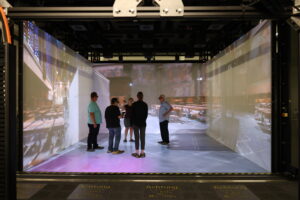
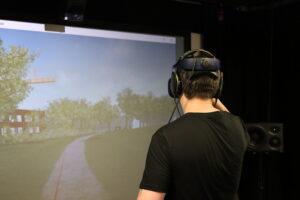
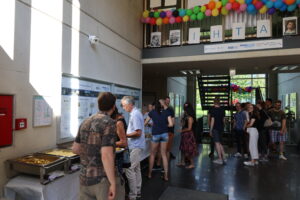
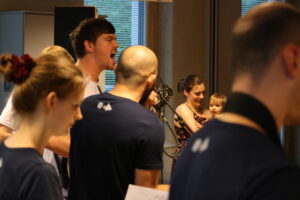
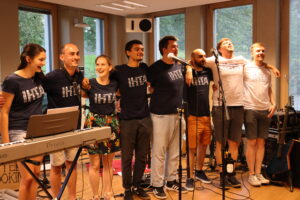
Equal-Life Consortium Meeting 2023 Stockholm
From April 3rd to 5th 2023, the Equal-Life Consortium Meeting hosted by the Karolinska Institute took place in Stockholm. The Equal-Life project is part of the Horizon 2020 Framework Programme by the European Union. The project’s aim is to better understand the different exposures (physical, social, internal) children experience in childhood and adolescence, which may have an impact on the individual health status as in adulthood.
Karin Loh and Julia Seitz attended the meeting as consortium members. Both presented parts of their work. Julia Seitz gave a talk in the PhD session on ‘Examining Listening Effort in Children in Classroom Situations’. As part of the session ‘Selected contributions from Equal-Life’, Karin Loh presented ‘Exploring noise effects by linking auditory selective attention switches and heart rate variability measured in children’.
- Foto Julia Seitz
- Foto Karin Loh
- Foto Jenny Selander
1st IHTA Retreat
An interchange for good teamwork between researchers
On 28th and 29th March 2023, the scientific staff of IHTA was on a retreat at Gut Hohenholz near Bedburg in the Rhein Erft Kreis. During these two days, the institute’s past was reflected, and it was discussed how the future of the IHTA can be shaped together. Moreover, there was an intensive exchange among each other’s scientific work in the form of poster sessions. The researchers presented each other’s projects and revealed which milestones needed to be reached to achieve specific goals. Between poster sessions team spirit was strengthened, and the future of teaching and workflows were addressed. Furthermore, it was discussed how the skills of individual researchers could be maintained and passed on to new staff members.
Overall, it was two successful days with a lot of input for each individual and a lot of output for the group at IHTA.
A big thank you to Joachim Bellut, who guided us through the two days with his great moderation!
- Group photo at the IHTA Retreat (Foto: Joachim Bellut)
- Poster session (Foto: Joachim Bellut)
- Poster session (Foto: Joachim Bellut)
- Team building task (Foto: Joachim Bellut)
Studienpreis der Deutschen Gesellschaft für Akustik 2023 an Julia Seitz
Im Rahmen der DAGA 2023 in Hamburg wurde der DEGA Studienpreis an M.Sc. Julia Seitz für Ihre herausragende Masterarbeit „Intentional Switching of Spatial Auditory Selective Attention in Preschool Children“ verliehen. Wir gratulieren!
- Übergabe des Studienpreises an Julia Seitz (Foto: Janina Fels)
DAGA 2023 in Hamburg – 49th Annual Conference on Acoustics
The 49th Annual Conference on Acoustics DAGA took place from March 6th to March 9th 2023, in Hamburg. The IHTA was represented there with 22 presentations and seven posters. The researchers presented their work in eleven different subject areas. This shows the broad range of topics the Institute covers in hearing technology and acoustics.
During the conference, the technical committees of the Deutsche Gesellschaft für Akustik e.V. (DEGA) met. In the technical committee Hörtechnik (Hearing Acoustics) Professor Janina Fels handed over the chair position after six years. Besides, the technical group Junge DEGA selected Simon Kersten as its new chairman. Jonas Heck, who was elected as deputy, supports him in this position.
After the dinner at the social evening on Wednesday, the IHTA Band performed two songs from their repertoire. On Thursday, a small group took the opportunity to participate in an excursion to the Elbphilharmonie. Not only the grand hall was visited, but also the rooftop was climbed.
- IHTA group picture (Foto: Janina Fels)
- Performance of the IHTA Band at the social evening (Foto: Lara Stürenburg)
- On the roof of the Elbphilharmonie (Foto: Lara Stürenburg)
DAGA 2023 – 49. Jahrestagung für Akustik
Again, IHTA is joining DAGA in Hamburg with interesting contributions from March, 6th, to March, 8th, 2023. We are delighted to invite to our presentations and posters. In total, IHTA members will be represented with 27 contributions (22 presentations and 5 posters):
| Presentations | ||||
|---|---|---|---|---|
| Tuesday, March 7th | ||||
| Jonas Heck, Josep Llorca-Bofí, Aakriti Jain, Michael Vorländer |
Text mining of audio-visual descriptors for concert halls | Raumakustik 1 – Qualitätsfragen und Fallstudien A | 14:00 | Saal X 1-2 |
| Lukas Vollmer, Elisabeta Balla, Björn Kampa, Janina Fels | The Auditory Mismatch Negativity as an EEG-derived Measure of Predictive Coding | Psychoakustik | 14:20 | Saal X 7-8 |
| Lukas Aspöck, Michael Vorländer, Anne Heimes, Andreas Herweg, Olivier Dazel |
An online course about acoustic simulations and auralization | Lehre der Akustik | 15:00 | Saal Y 4 |
| Shaimaa Doma, Cosima Ermert, Janina Fels |
On the monaural contribution to HRTF discrimination | Perceptual Optimization of Dynamic Binaural Rendering 2 | 16:40 | Saal Y 9 |
| Lara Stürenburg, Hark Braren, Lukas Aspöck, Janina Fels | Akustische Vermessung einer Wärmepumpe für Hörexperimente und Simulationen | Strömungsakustik in der Energiewende | 17:20 | Saal X 9-10 |
| Wednesday, March 8th | ||||
| Marco Berzborn, Michael Vorländer | Analytic Model Based Analysis of Modal Sound Field Decay | Raumakustik 2 – Messung und Simulation A | 09:00 | Saal X 1-2 |
| Thomas Deutsch, Janina Fels | Evaluating Models for the Simulation of Cochlear Hearing Loss | Audiologische Akustik 3 – Charakterisierung des Hörsystems | 10:00 | Saal Y 5 |
| Pascal Palenda, Michael Kohnen, Michael Vorländer |
Influence of Position Mismatch on the Perception of Early Reflections of One’s Own Voice | Virtuelle Akustik 1 | 10:40 | Saal X 11-12 |
| Karin Loh, Edina Fintor, Sophie Nolden, Janina Fels | Comparing Children’s and Adults’ Intentional Switching of Auditory Selective Attention in Spatial and Noisy Acoustic Environments | Psychoakustik | 14:00 | Saal X 7-8 |
| Julia Seitz, Karin Loh, Sophie Nolden, Janina Fels | Investigating Intentional Switching of Spatial Auditory Selective Attention in an Experiment with Preschool Children | Psychoakustik | 14:20 | Saal X 7-8 |
| Hark Braren, Janina Fels | Individualized Head-related Transfer Functions for Children | Virtuelle Akustik 3 | 16:40 | Saal X 11-12 |
| Mark Müller-Giebeler, Michael Vorländer | Präzise Modellierung diffuser Schallfelder zur inversen Bestimmung akustischer Materialparameter | Raumakustik 2 – Messung und Simulation B | 17:40 | Saal X 1-2 |
| Anne Heimes, Michael Vorländer |
Measurement setup design for scattering patterns based on numerical simulations | Raumakustik 2 – Messung und Simulation B | 18:20 | Saal X 1-2 |
| Ingo Witew, Michael Vorländer | Wie genau müssen Messpositionen für reproduzierbare Klarheitsmaß Messungen definiert werden? | Raumakustik 2 – Messung und Simulation B | Saal X 1-2 | |
| Thursday, March 9th | ||||
| Chinthusa Mohanathasan, Jonathan Ehret, Cosima A. Ermert, Janina Fels, Torsten W. Kuhle, Sabine J. Schlittmeiers |
Towards More Realistic Listening Research in Virtual Environments: The Effect of Spatial Position of Two Talkers in Conversations on Memory and Listening Effort | SPP2236 – Auditory Cognition in Interactive Virtual Environments 1 | 09:20 | Saal Y 5 |
| Josep Llorca-Bofí, Jonas Heck, Michael Vorländer |
Reproducibility Exploration of Individual Vocabulary Profiles on Urban Soundscapes: Driescher Hof, Aachen | Soundscape | 09:40 | Saal X 5-6 |
| Cosima A. Ermert, Jonathan Ehret, Torsten W. Kuhlen, Chinthusa Mohanathasan, Sabine J. Schlittmeier, Janina Fels |
Audio-visual content mismatches in the serial recall paradigm | SPP2236 – Auditory Cognition in Interactive Virtual Environments 1 | 09:50 | Saal Y 5 |
| Chalotorn Möhlmann, Simon Kersten, Michael Vorländer |
Finite Element Simulation of the Occlusion Effect in the Ear Canal | Assisted Hearing – Testing, Models, Quality 1 | 10:00 | Saal X 11-12 |
| Lukas Aspöck, Stefan Morent, Michael Vorländer | Simulated reverberation for choir recordings in virtual churches | Raumakustik | 10:20 | Plenarsaal |
| Simon Kersten, Henning Taschke, Michael Vorländer | Fluid Motion and Pressure Distribution in the Human Inner Ear during Bone Conduction Hearing | Assisted Hearing – Testing, Models, Quality 1 | 10:20 | Saal X 11-12 |
| Carolin Breuer, Stephan Fremerey, Larissa Leist, Maria Klatte, Alexander Raake, Janina Fels |
Investigating the Influence of Visual Distractors on the Voluntary Switchtig of Auditory Selective Attention in Virtual Reality | SPP2236 – Auditory Cognition in Interactive Virtual Environments 1 | 10:40 | Saal Y 5 |
| Elie Abi Raad, Jose Maria Gomez Belmonte, Michael Vorländer |
Frequency response characterization of the welding process in Ultrasonic Metal Welding | Structure-borne sound | 16:00 | Saa Y6 |
| Poster | ||||
| Wednesday, March 8th | ||||
| Stefan Winkelmann, Lara Stürenburg, Isabel S. Schiller, Janina Fels, Sabine J. Schlittmeier |
Subjektiver akustischer Komfort von Luftdurchlässen für Gebäudelüftungen | Psychoakustik | 15:40-16:20 |
Foyer Z, Posterinsel H |
|
Marco Wegener, Jonas Heck, Josep Llorca-Bofí, Rouben Rehman, Christian Dreier, Philipp Schäfer, Michael Vorländer |
Introducing an Unreal Engine toolkit for audio-visual perception studies in the virtual lab IHTApark | Virtuelle Akustik (Late Poster) |
15:40-16:20 |
Foyer Z, Posterinsel Q |
| Thursday, March 9th | ||||
| Frederike Rust, Karin Loh, Lukas Aspöck, Janina Fels | Auswirkung akustischer Maßnahmen auf das Lärmempfinden im Klassenraum | Raumakustik (Late Poster) |
11:00-11:40 | Foyer Z, Posterinsel R |
| Jianliang Gao, Ingo Witew, Lukas Aspöck, Michael Vorländer, S. K. Tang | Global sound field estimation of a theatre using an efficient multi-channel room acoustic measurement system | Raumakustik (Late Poster) |
11:00-11:40 |
Foyer Z, Posterinsel R |
| Lili Pan, Jianliang Gao, Yuezhe Zhao | An optimized procedure for random-incidence scattering coefficient measurement in 1:10 scaled reverberation room | Raumakustik (Late Poster) |
11:00-11:40 |
Foyer Z, Posterinsel R |
An overview of all contributions and updated information can be found in the DAGA 2023 App.
We are looking forward to seeing you at DAGA 2023!
BaLSaM project at IHTA invites to the kickoff event
The BaLSaM project investigates how traffic noise can be simulated and auralized, aiming to develop concepts to minimize road noise to create more pleasant environments. The goal is to make living spaces more attractive for people. For this purpose, the simulation focuses on the noise perception of humans so that the noise pollution is represented as accurately as possible. This simulation technique will later be used in planning traffic and living spaces. Additionally, an optimization study for exemplary scenarios will also be carried out during the project. If you are interested in this topic, we would like to invite you to the online BaLSaM kickoff event. You can register here: (DE) http://bit.ly/BaLSaMde
BaLSaM is funded within the mFUND framework.
The BaLSAM project partners are:
- RWTH Aachen University
- RHA REICHER HAASE ASSOZIIERTE GmbH
- HEAD acoustics GmbH
BaLSaM stands for “Braunkohlereviere als attraktive Lebensräume durch Straßengeräuschsimulation auf Basis bestehender Verkehrsdaten zur Minimierung von Lärm” and more information on the project can be found here: https://www.ika.rwth-aachen.de/de/pressemitteilungen/4140-attraktive-lebensräume-fürs-braunkohlerevier-–-projekt-balsam-hilft,-belastung-durch-straßenlärm-zu-minimieren.html
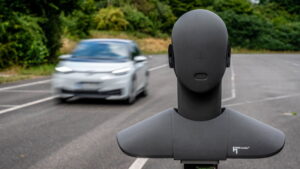
International Congress on Acoustics ICA 2022
The Institute for Hearing Technology and Acoustics looks back on a very enjoyable and successful 24th International Congress on Acoustics ICA 2022 in Gyeongju, South Korea. IHTA was present with a total of 10 delegates and actively contributed to the program with two theme organizers, five special session organizers, 10 oral presentations, and one plenary lecture. The conference was an excellent event to meet the international acoustic community in real life again.
- Entrance of the congress venue (Foto: Janina Fels)
- IHTA group picture with Alumnus Bruno Masiero (Foto: Janina Fels)
- Plenary talk by Janina Fels (Foto: Jamilla Balint)
- Janina Fels at her plenary talk (Foto: Cheol-Ho Jeong)
- ICA-ASA Young Scientist Conference Attendance Grant for Cosima Ermert (Foto: ICA)
- Poster and interactive IHTApark Demo (Foto: Josep Llorca-Bofi)
- Presentation by Josep Llorca-Bofi (Foto: Josep Llorca-Bofi)
- Presentation by Jonas Heck (Foto: Josep Llorca-Bofi)
- Presentation by Christian Dreier (Foto: Josep Llorca-Bofi)
The full proceedings of the conference are available for download on the ICA 2022 website.
IHTA at the BauSIM conference in Weimar
From the 20th to the 22nd September 2022, the BauSIM conference took place. The scientific core topic of the conference is traditionally the energetic simulation in the building sector and offers an ideal discussion forum for experts from science and industry for mutual exchange. The conference is organized by the and IBSPA Germany-Austria, member of the International Building and Performance Simulation Association (IBPSA) This year’s conference introduced a new session on acoustic simulation topics, and our institute was present.
In particular, our Junior Principal Investigator Dr. Josep Llorca-Bofí, from the PAAD group was invited as key-note speaker, talking about The city – A machine for noise? Virtual acoustics in architectural design research. Together with our PhD student M. Sc. Jonas Heck and Professor Michael Vorländer, the following research paper was presented: 3D photogrammetry for auralization – An approach for geometry simplification and material categorization.
- Key-note talk Dr. Josep Llorca-Bofí
- Bauhaus-Universtät Weimar
- BauSIM lecture hall
- IHTApark demonstrator
- Immersive audio and visuals
- Portable research laboratory using head-mounted display and equalized headphones
- Visit to the acoustic laboratory at the chair of Building Physics
- Visit to the acoustic laboratory at the chair of Building Physics
- Optic visualization of thermal air movement
- Visit to the optics laboratory at the chair of Building Physics
junge DEGA Workshop 2022 in Stuttgart
From 2nd to 4th September 2022, after a three-years break due to the Covid-19 pandemic, the “junge DEGA Herbstworkshop” took place in Stuttgart, like the DAGA conference earlier this year. Junge DEGA is a sub-group of the German Acoustical Society with the mission to connect students, PhDs and young professionals in the domain of acoustics. It organizes special sessions and panel discussions during the Annual German Conference on Acoustics (DAGA), providing information on research funding opportunities and job entry. Furthermore, junge DEGA offers a mentoring program with active participation from industry and academia.
Two PhD students of the Institute for Hearing Technology and Acoustics, Simon Kersten and Jonas Heck, as well as Nils Rummler, recently graduated bachelor student, participated in this year’s workshop. The program started with visits at the Fraunhofer Institute for Building Physics IBP and the Center for Building Physics (ZfB, Hochschule für Technik Stuttgart). Furthermore, it consisted of short presentations given by the participants, a plenary meeting of the junge DEGA group to plan the following year’s activities and a guided visit of the new main station construction site (known as Stuttgart 21) with a focus on noise and vibration control. The weekend was concluded with a hands-on workshop on building a loudspeaker from residual materials and competing for the highest sound pressure level.
Pictures from the workshop can be found in the gallery below.
- Participants of the junge DEGA Herbstworkshop 2022
- Loudspeaker competition
- Loudspeaker competition
- Loudspeaker competition
- Visit of the Stuttgart21 construction site
Inter-noise 2022 in Glasgow
This year’s inter-noise conference took place from August 21st to 24th in Glasgow, Scotland. More than 1000 delegates participated in this conference and presented interesting research in the field of acoustics and noise. Highlights of the conference included key note talks by Lily Wang (University of Nebraska–Lincoln) on indoor acoustic conditions and by the Salford Group (Andy Moorhouse, Andy Elliott and Josh Meggitt) on virtual acoustic prototypes.
Four researchers of the Institute for Hearing Technology and Acoustics travelled to the conference and presented the following research papers:
- Eli Abi Raad: Experimental setup for laser vibrometry measurements of the vibrating horn in Ultrasonic Metal Welding
- Lukas Aspöck: Differences between measured and simulated room impulse responses
- Christian Dreier: Vehicle pass-by noise auralization in a virtual urban environment
- Lara Stürenburg: Acoustic Measurements and Psychoacoustic Analyses of Ventilation Diffusers
The full conference proceedings are also available for download here.
The interesting scientific program was accompanied by an entertaining social program as well as various early career events, which helped many of the younger participants to connect with each other. The International Institute of Noise Control Engineering (i-ince) also supported young researchers by providing travel grants, one of which was received by Elie Abi Raad. Congratulations, Elie, to this grant.
Pictures from the conference including the grant ceremony can be found in the gallery below.
- Impressions of the presentations
- Impressions of the presentations
- Impressions of the presentations
- Travel grant ceremony Elie Abi Raad
- All travel grant recipients
- Entry to the social event of the conference
IHTA at the POSTER 2022 Conference
After a break of three years due to the pandemic, this year in May, the 26th International Student Conference on Electrical Engineering POSTER 2022 was held in Prague, Czech Republic. This annual event in Czech’s capital city is an excellent opportunity for undergraduate and postgraduate students to gain first experiences at an international conference and strengthens the relationship between CTU Prague and RWTH Aachen University.
Three Phd students of the Institute for Hearing Technology and Acoustics presented scientific work in Prague:
- Anne Heimes: Virtual reality environments for soundscape research
- Carolin Reimers: Investigating the Auditory Selective Attention Switch in Virtual Reality
- Lukas Vollmer: Evaluating Spatial Audio for Hearing Aid Applications
We are happy to report that the work by Anne Heimes was selected by a jury as the best paper in the category Informatics and Cybernetics. Congratulations to Anne for this award!
Pictures of the event can be found on the conference’s website.
Verabschiedung von Herrn Uwe Schlömer
Nach einer fast 50-jährigen Dienstzeit ist am 1. August 2022 der Leiter der mechanischen Werkstatt, Uwe Schlömer, in den wohlverdienten Ruhestand gegangen. Zur Verabschiedung wurde, entsprechend der Tradition der Doktorhüte, diesmal ein „Meisterhut“ überreicht, begleitet von einem Buch mit Grußworten aktueller sowie ehemaliger Mitarbeiter*innen und Anekdoten aus der langjährigen Dienstzeit.
Das IHTA bedankt sich auch an dieser Stelle nochmal für die hervorragende, immer verlässliche Arbeit von Uwe Schlömer und wünscht alles Gute für den Ruhestand.
Die mechanische Werkstatt des Instituts wird nun von Marc Eiker geleitet.
- Foto: Lukas Vollmer
- Foto: Lukas Vollmer
- Foto: Lukas Vollmer
- Foto: Lukas Vollmer
Promotionsprüfung Dipl.-Ing. Jonas Stienen
Am 3. Juni 2022 hat Herr Jonas Stienen seine mündliche Promotionsprüfung erfolgreich abgeschlossen.
Herr Stienen promovierte über das Thema:
„Real-time auralisation of outdoor sound propagation“
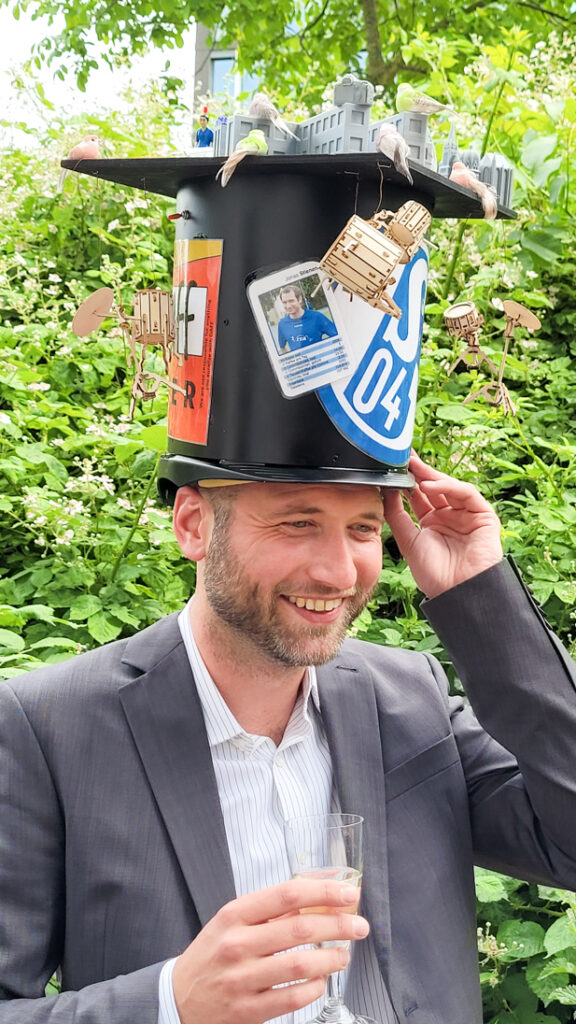
Doktorhut- und Doktortape-Übergabe
Das IHTA gratuliert sehr herzlich!
Abstract der Doktorarbeit:
Auralisation describes the process of generating and presenting audible sound using computer programs and audio hardware. Since the result is perceived naturally by the human’s auditory system, a demonstration by means of auralisation is easily comprehensible and does neither require background knowledge nor expertise. Producing auralisation under real-time constraints increases the implementation demands significantly. Real-time auralisation is required in applications that respond to user interaction, for example, in interactive Virtual Reality (VR) environments. Dynamically moving sound sources and receivers evoke a change in the perceived sound, and the corresponding result must be provided as quickly as possible. A feeling of immersion can be created if the response time of the system does not exceed perceptual thresholds and thus enables a plausible scene presentation. To achieve this emotional state, real-time auralisation must comply with the expected physical behaviour.
The realisation of a real-time auralisation application for outdoor environments represents a promising addition to current noise assessment procedures. It also delivers the foundation for the auditory modality in outdoor VR scenarios, which can server as as an audio-video tool for perception-related scientific investigations.
In the past, auralisation has gained much attention in room acoustics. An attempt to transfer the established concepts and approaches to outdoor environments reveals two systemic deficiencies.
Firstly, room acoustic simulations are commonly based on Geometrical Acoustics (GA), which determines reflected sound rapidly and with high accuracy, but struggles to incorporate diffracted sound. In most urban settings, however, the transmission of sound from a noise source to a receiver contains a significant contribution of both reflected and diffracted components. Furthermore, dynamic virtual environments are time-variant. Traditional realisations often neglect this characteristic, treating an acoustic environment as temporarily static on a frame-by-frame basis. Adaption to dynamic events is implemented by transition of sequences of time-invariant simulations, which is contradictory to the highly dynamic nature of outdoor scenarios.
To address these two misconceptions, a real-time auralisation system is suggested that attaches increased importance to fast geometric diffraction simulations and is based on an audio rendering network that reflects the time-variant nature of dynamic outdoor sound propagation.
- Beginn des öffentlichen Promotionsvortrags
- Einleitung durch Prof. Michael Vorländer
- Während des öffentlichen Promotionsvortrag
- Während des öffentlichen Promotionsvortrag
- Während des öffentlichen Promotionsvortrag
- Fragerunde mit Prof. Vorländer und Zweitgutachter Prof. Julio Cesar Boscher Torres
- Doktorhut
- Übergabe des Doktorhutes
Das IHTA bei der DAGA Stuttgart 2022
Nach dreijähriger, pandemiebedingter Pause fährt das Institut für Hörtechnik und Akustik wieder zur DAGA Tagung, die dieses Mal in Stuttgart stattfindet.
Hier eine Übersicht der wissenschaftlichen Beiträge (22.3.2022 – 24.3.2022):
Vorträge
| Wann? | Erstautor*in | Titel | Raum | Sitzung |
| Dienstag 14:00 Uhr |
Lukas Aspöck | Configuration of a real-time auralization framework for complex scenes | 7-01 | Virtuelle Akustik für dynamische Szenen: Methoden und experimentelle Anwendungen 1 |
| Dienstag 14:20 Uhr |
Pascal Palenda | Open-Source Simulation Scheduling Framework for Real-Time Auralisation | 7-01 | Virtuelle Akustik für dynamische Szenen: Methoden und experimentelle Anwendungen 1 |
| Dienstag 14:20 Uhr |
Simon Kersten | Finite Element Simulation of Bone Conduction in the Human Head: The Inner Ear Component | 9-0.267 | Physiologische Akustik |
| Dienstag 14:20 Uhr |
Nils Rummler | Analysis of Multi-Exponential Decay Constant Estimation Methods | 47-03 | Messung der Schallabsorption 1 |
| Dienstag 14:40 Uhr |
Christian Dreier | Inverse modelling of vehicle pass-by noise for auralizations | 7-01 | Virtuelle Akustik für dynamische Szenen: Methoden und experimentelle Anwendungen 1 |
| Dienstag 14:40 Uhr |
Masoumeh Salehi | Ersatzschaltbildmodellierung von Knochenschall | 9 0.267 | Physiologische Akustik |
| Dienstag 15:00 Uhr |
Mark Müller-Giebeler | Neural Network Based In-situ Method to Determine Surface Impedance and Absorption Coefficient of Porous Materials | 47-03 | Messung der Schallabsorption 1 |
| Dienstag 15:20 Uhr |
Roberto Campos Ruiz | Dynamic Road Noise Mapping Prediction Using Machine Learning | 9-0208 | Geräuschbeurteilung |
| Dienstag 17:20 Uhr |
Elie Abi Raad | On using machine learning in Ultrasonic Metal Welding | 57-06 | AI-based methods for audio analysis and knowledge extraction 2 |
| Mittwoch 09:40 Uhr |
Thomas Deutsch | An Assessment of Higher-Order Ambisonics Reproduction in the Context of Spatial Release from Masking | 9-01 | Psychoakustik 3 |
| Mittwoch 14:00 Uhr |
Michael Kohnen | SAQI comparison of CTC, Ambisonics and VBAP | 7-01 | Virtuelle Akustik 2 |
| Mittwoch 15:20 Uhr |
Jonas Heck | Ambient Sounds in Auralization – Calibration Method for Spherical Microphones | 7-01 | Virtuelle Akustik 2 |
| Mittwoch 17:00 Uhr |
Lukas Vollmer | Stimulus Onset Asynchronies in Audio-visual Serial Recall Performance | 9-01 | Psychoakustik 5 |
| Donnerstag 08:40 Uhr |
Jamilla Balint | The methodology matrix to investigate evaluation methods in auditory cognition in interactive virtual environments | 9-0208 | SPP 2236 AUDICTIVE – Auditory Cognition in Interactive Virtual Environments 1 |
| Donnerstag 09:00 Uhr |
Hark Braren | On the Influence of Knee Reflections in HRTF Measurements | 47-03 | Binauraltechnik |
| Donnerstag 09:00 Uhr |
Ingo Witew | Zur Unsicherheit von Raumimpulsantwortmessungen | 47-01 | Raumakustik 1 |
| Donnerstag 09:40 Uhr |
Josep Llorca Bofi | Unfolding urban vocabularies – Audio-visual description of public spaces and their connections to urban analysis | 47-05 | Soundscape |
| Donnerstag 10:20 Uhr |
Carolin Reimers | Investigating Different Cueing Methods for Auditory Selective Attention in Virtual Reality | 9-0208 | SPP 2236 AUDICTIVE – Auditory Cognition in Interactive Virtual Environments 1 |
| Donnerstag 10:40 Uhr |
Philipp Schäfer | Auralization with Linked Atmospheric and Urban Noise Propagation Models | 9-01 | Lärm – Schifffahrt und Flugverkehr 2 |
| Donnerstag 14:00 Uhr |
Cosima Ermert | Examining the Influence of Varying Audio Reproduction Methods on Verbal Short-Term Memory | 9-0208 | SPP 2236 AUDICTIVE – Auditory Cognition in Interactive Virtual Environments 2 |
| Donnerstag 14:20 Uhr |
Anne Heimes | Numerical simulation of scattering patterns of a sineshaped surface | 47-01 | Raumakustik 2 |
| Donnerstag 14:20 Uhr |
Marco Berzborn | Spatio-temporal analysis of anisotropic reverberation | 47-05 | Rendering, Processing, and Perception of Diffuse Reverberation |
Poster
| Wann? | Erstautor*in | Titel | Raum | Sitzung |
| Dienstag 15:40 Uhr |
Karin Loh | Challenges and methods to design a dual-task experiment in spatial auditory environments for young children (3-6 years old) | 9-01, J | Psychoakustik (Poster 1) |
| Mittwoch 15:40 Uhr |
Lara Stürenburg | Aeroacoustic Performance of Air Diffusers and their Psychoacoustic Evaluation | 47-02, A | Strömungsakustik (Poster) |
| Donnerstag 11:00 Uhr |
Shaima’a Doma | Interrelation Analysis of Distance Metrics for Head-Related Transfer Functions | 47-03, A | Augmented Acoustic Reality (Poster) |


